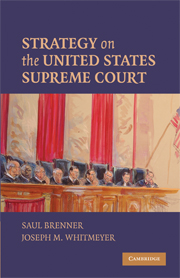Book contents
- Frontmatter
- Contents
- Preface
- PART I INTRODUCTION
- PART II CERTIORARI
- 4 The Losing Litigant Model
- 5 The Outcome-Prediction Strategy
- PART III THE CONFERENCE VOTE ON THE MERITS
- PART IV THE MAJORITY OPINION AND OTHER OPINIONS
- PART V THE FINAL VOTE ON THE MERITS
- PART VI CONCLUDING CHAPTERS
- Appendix 1 Decision Making on the United States Supreme Court
- Appendix 2 Additional Questions to Explore
- References
- Table of Cases
- Index
4 - The Losing Litigant Model
Published online by Cambridge University Press: 05 June 2012
- Frontmatter
- Contents
- Preface
- PART I INTRODUCTION
- PART II CERTIORARI
- 4 The Losing Litigant Model
- 5 The Outcome-Prediction Strategy
- PART III THE CONFERENCE VOTE ON THE MERITS
- PART IV THE MAJORITY OPINION AND OTHER OPINIONS
- PART V THE FINAL VOTE ON THE MERITS
- PART VI CONCLUDING CHAPTERS
- Appendix 1 Decision Making on the United States Supreme Court
- Appendix 2 Additional Questions to Explore
- References
- Table of Cases
- Index
Summary
This book mainly focuses on the use of strategies by the justices of the United States Supreme Court. In this chapter, however, we preface this endeavor with a consideration of why a losing litigant might seek review at the Supreme Court level.
Why would anyone take a case to the United States Supreme Court? If one weighs costs and benefits, except for the unpaid or in forma pauperis petitions, the financial costs of submitting a petition for a writ of certiorari are large, and the chances of getting one's case heard are slim. In the 2004 term of the Court, for example, only 69 of the 2,041 paid petitions (3 percent) were granted cert (Epstein, Segal, Spaeth, and Walker, 2007, Tables 2–6). The percentage of the unpaid petitions was even lower (0.2 percent). Even if cert is granted, there is a good chance that the petitioner will lose on the merits. Epstein and Knight (1998, p. 27), for example, tell us that in the period from 1953 through 1994, the Court affirmed the decision of the lower court 38.7 percent of the time. It is certain that the financial costs will increase dramatically if cert is granted.
Despite these percentages, we can suggest why it might be rational for a litigant who has lost in the lower court to file a petition for a writ of certiorari. There has been little research on this topic to date, so for the most part we will reason theoretically.
- Type
- Chapter
- Information
- Strategy on the United States Supreme Court , pp. 31 - 38Publisher: Cambridge University PressPrint publication year: 2009



